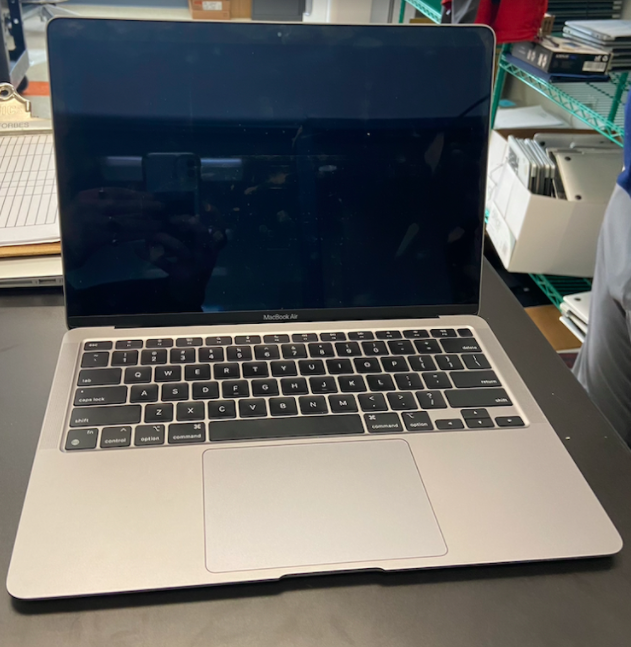Riley Thibodeau ‘23
Episcopal students’ learning experience has become increasingly dependent upon laptops, which are necessary for completing homework assignments, doing in-class work, and communicating with teachers. However, the role of this technology only came into effect during the past decade.
William Forbes, Technical Services Coordinator, provides insight into what factors contributed to this change, explaining, “The educational world was tilting towards the functionality of being able to work remotely, at home, to do homework on it, to email.”
EA staff, including Forbes, attended a conference at the Learning Institute regarding the one-to-one policy of laptops to students in 2012. They also debated on potential devices to use, from the Lenovo Book to iPads. Forbes says, “Upon surveying the parents, the students, the faculty, the staff, for both form factor, weight, functionality, capability, we settled on the Macbook Air laptop.”
Alongside a growing usage of technology in education, the decision to go one-to-one was also related to financial need. Forbes states, “Now the demographics are such that you can’t ask a family you need to get your child a laptop because it’s quite an expense for those who may find it difficult to afford them. So that was the essence of why we as a school wished to proceed with issuing a laptop to every student– to remove the issue of financing it.”
Having reached this decision, EA gradually rolled out laptops beginning in 2013, to offset the costs of buying a laptop for every student in the Middle and Upper School at once. Now, every student from fifth to twelfth grade has a laptop. Episcopal purchases 325 laptops a year for the 5th grade, 9th grade, and faculty members.
This year, the model of laptops being issued has changed. Forbes explains the switch, “The model years of laptops have evolved. The last model that we issued to students was a 2017. What happened is that everybody had the same machine, we had that form factor for everybody. That form factor was discontinued, no longer supported, they [Apple] call it end-of-life, end-of-service.”
While the discontinuation of the model forced EA to upgrade, the change was also needed. Louie Beardell ‘23 explains, “The new laptops for incoming freshmen were a much needed addition, especially with Zoom becoming such an important aspect of learning at EA. Along with this, many students struggle from short battery life and slow computers, both of which are addressed in the new models.”
Ashley Kim ‘23 says, “I’ve noticed that lately my computer battery drains super quickly. This is always inconvenient when I need my computer and don’t have access to a charging station.”
This change has only affected the teachers, freshmen, and fifth grade classes receiving them. Forbes continues, “Just like in the inception of the one-to-one program, we can’t afford to purchase 800 laptops while 600 of them are still working and in service.” There are 325 new laptops purchased every year, which are for roll over faculty, new faculty and every four years the teachers and the students get a new machine.
The new laptop is well-appreciated among the freshmen, especially those who had the 2017 model while in Middle School. Maura Irish ‘25 states, “I can definitely tell the difference between this laptop and the one that I had last year, and I like this one a lot better. It is much faster and it has Touch ID.”
Ali Dennis ‘25 adds, “My laptop this year is a lot nicer than my one from last year, and it has a much better charger.”
As a result of the virtual learning caused by the COVID-19 pandemic, the one-to-one policy has been extended to the Lower School. Originally, Pre-K through 2nd grade did not have their own personal devices. However, during 2020, the COVID-19 pandemic forced the school to adapt and find a new way to ensure the younger students were still able to learn from home. As a result, Forbes explains, “[the tech department was able to] cobble together with the library carts, iPad carts and iPads all over campus that we reclaimed to then reissue to those students so then they did have a viable ability to be remote.” Over the summer, more iPads were purchased so that every student and teacher in the Lower School now has an iPad. Also, the addition of iPads meant that the following year when students were allowed back onto campus, those who used the virtual learning option could still participate fully in class.
Throughout the past decade Episcopal’s use of technology has seen significant evolution and progress. From the introduction of the one-to one laptop policy, to changes, like virtual learning adaptations, which were accelerated by COVID, the continually developing technology shapes the EA learning experience.

Photo Courtesy of Gianna Trala ’23